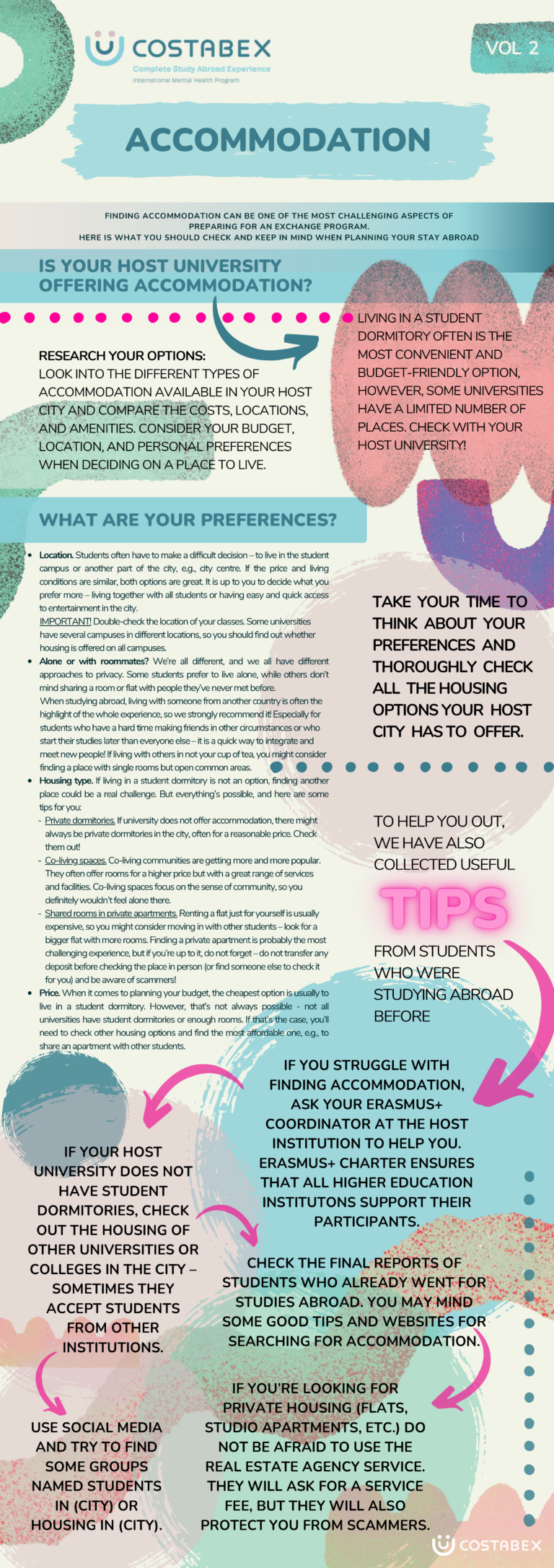Finding accommodation can be one of the most challenging aspects of preparing for an exchange program. Here is what you should check and keep in mind when planning your stay abroad:
Is your host university offering accommodation?
Living in a student dormitory often is the most convenient and budget-friendly option, however, some universities have a limited number of places. Check with your host university!
Research your options: look into the different types of accommodation available in your host city and compare the costs, locations, and amenities. Consider your budget, location, and personal preferences when deciding on a place to live.
Location. Students often have to make a difficult decision – to live in the student campus or another part of the city, e.g., the city centre. If the price and living conditions are similar, both options are great. It is up to you to decide what you prefer more – living together with all students or having easy and quick access to entertainment in the city.
Important! Double-check the location of your classes. Some universities have several campuses in different locations, so you should find out whether housing is offered on all campuses.
Alone or with roommates? We’re all different, and we all have different approaches to privacy. Some students prefer to live alone, while others don’t mind sharing a room or flat with people they’ve never met before.
When studying abroad, living with someone from another country is often the highlight of the whole experience, so we strongly recommend it! Especially for students who have a hard time making friends in other circumstances or who start their studies later than everyone else – it is a quick way to integrate and meet new people! If living with others is not your cup of tea, you might consider finding a place with single rooms but open common areas.
Housing type. If living in a student dormitory is not an option, finding another place could be a real challenge. But everything’s possible, and here are some tips for you:
- Private dormitories. If university does not offer accommodation, there might always be private dormitories in the city, often for a reasonable price. Check them out!
- Co-living spaces. Co-living communities are getting more and more popular. They often offer rooms for a higher price but with a great range of services and facilities. Co-living spaces focus on a sense of community, so you definitely wouldn’t feel alone there.
- Shared rooms in private apartments. Renting a flat just for yourself is usually expensive, so you might consider moving in with other students – look for a bigger flat with more rooms. Finding a private apartment is probably the most challenging experience, but if you’re up to it, do not forget – do not transfer any deposit before checking the place in person (or find someone else to check it for you) and be aware of scammers!
Price. When it comes to planning your budget, the cheapest option is usually to live in a student dormitory. However, that’s not always possible – not all universities have student dormitories or enough rooms. If that’s the case, you’ll need to check other housing options and find the most affordable one, e.g., to share an apartment with other students.
Take your time to think about your preferences and thoroughly check all the housing options your host city has to offer.
To help you out, we have also collected useful tips from students who were studying abroad before:

- If you struggle with finding accommodation, ask your Erasmus+ coordinator at the Host institution to help you. Erasmus+ Charter ensures that all Higher Education Institutions support their participants.
- If your host university does not have student dormitories, check out the housing of other universities or colleges in the city – sometimes they accept students from other institutions.
- If you’re looking for private housing (flats, studio apartments, etc.) do not be afraid to use the real estate agency service. They will ask for a service fee, but they will also protect you from scammers.
- Check the final reports of students who already went for studies abroad. You may mind some good tips and websites for searching for accommodation.
- Use social media and try to find some groups named Students in (city) or Housing in (city).
Useful resources:
Check ESN partners for housing discounts: https://www.esn.org/partners
Erasmus housing in the Czech Republic: http://erasmus-databaze.naep.cz/modules/erasmus/
